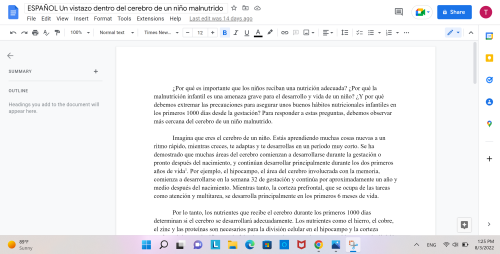My name is Teva Alon, and I am a U2 McGill student in the Faculty of Arts and Science, pursuing a major in Cognitive Science and a minor in Gender, Sexuality, and Feminist Studies. My international experience was an amazing opportunity that I would not have been able to pursue without the Schull Yang International Experience Awards, so I would like to thank Mr. Schull and Ms. Yang for making this experience possible!
The reason I wanted to participate in my international experience was to pursue my minor while furthering my passions for writing and language. As a student of gender and sexuality studies, I wanted to engage with the subject material in a real-world setting and gain experience writing about these topics. Additionally, I wanted to learn in an international context and improve my Spanish, which was advanced but not yet at a fluent level.
The international activity I participated in was an internship with the United Nations World Food Program Latin America and Caribbean Office in Panama City. The UN World Food Program is the world’s largest humanitarian organization. They work to provide food assistance to people all around the world, as well as develop sustainable programs to minimize food insecurity in vulnerable populations. At the World Food Program, I worked as part of the communications unit. Throughout the internship, I worked on a variety of tasks, including writing articles in Spanish and English for the WFP website, writing tweets and social media posts for the WFP Social Media accounts, and drafting proposals for new projects and exhibits. My main learning objective was to write articles about the effects of gender on food insecurity and global crisis, but I also wanted to learn about the inner workings of a humanitarian organization, which included learning about their social media and project operations.

This internship greatly furthered my education. One of my goals was to expand on the topics that I learned in my gender and sexuality minor, but to my pleasant surprise, I was also able to work on topics related to my cognitive science major. I was able to write articles about the effects of food insecurity on mental health and the impact of malnutrition on a child’s brain, and it was helpful to supplement my neuroscience and psychology classes with these real-life experiences. Additionally, my experience working in Spanish inspired me to study abroad in a Spanish-speaking country in the future and maybe even pursue an additional Spanish minor.
Overall, my internship with the UN World Food Program was an invaluable experience that will be one of the highlights of my undergraduate career. Thank you so much to Joseph Schull and Anna Yang for providing me with the support to pursue this opportunity!

